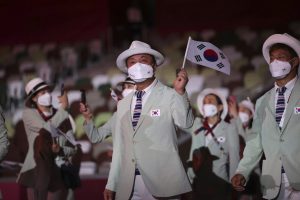South Korea has already racked up 12 medals, including four golds, in Tokyo as the summer games wrap up their first week. Of those four golds, three are for archery, where South Korean teams have dominated for decades — in fact, the women’s archery team gold has never gone to any other country since the event was introduced at the Games in 1988. The other gold came from men’s team sabre, and South Korea has picked up silver and bronze medals in other fencing events as well as judo and taekwondo.
Unlike in the United States where plummeting viewership numbers have been making headlines, it seems like Koreans are still steadily tuning in to watch the games, especially during marquee sports like soccer and events featuring top Korean athletes. The opening ceremonies on July 23 racked up 17.2 percent ratings across the three major broadcasters, although even the most-watched broadcast of the ceremonies on KBS was only the third highest rated show for the day.
Outside of the arenas, news has focused almost entirely on the evolving COVID-19 situation both in Tokyo and around the world, and how the pandemic has deeply affected the Games even now, a year after they were originally scheduled. But beyond the pandemic, there have been some small political developments tied to the Tokyo Olympics as well.
Around a dozen high-level foreign dignitaries will travel to Japan to attend the games in some capacity, including U.S. First Lady Jill Biden and French President Emmanuel Macron. However, South Korean President Moon Jae-in will not be among them.
Earlier this summer, it was reported that Seoul and Tokyo were in discussions to hold a summit meeting between their two leaders during the Olympics, which would be a first since Prime Minister Suga Yoshihide took office in September. However, talks fell through after the two sides reportedly failed to reach an agreement on a productive agenda for a meeting.
Although it was not the official reason for Moon’s decision to sit out the visit, lewd comments made by the deputy chief of mission at Japan’s embassy in Seoul, in which he implied that Moon’s efforts to bridge relations between the countries were one-sided, certainly didn’t help. In fact, possibly in part because of the fallout from those comments, the Korean public widely supported Moon’s decision to forego a visit to Tokyo for now, with 65 percent in favor according to recent polling.
That doesn’t mean that there have been no productive diplomatic meetings in Tokyo, however. Last week, ahead of the opening of the Games, senior officials from the United States, South Korea, and Japan sat down for a trilateral meeting focused in particular on security issues in the region, including working together to re-start discussions with North Korea over their nuclear program.
However, the latest news that inter-Korean communications are back up and running, plus the rocky road South Korea-Japan relations still seem to be on, may mean that focus on mending the bilateral relationship is on the back burner for now.
































